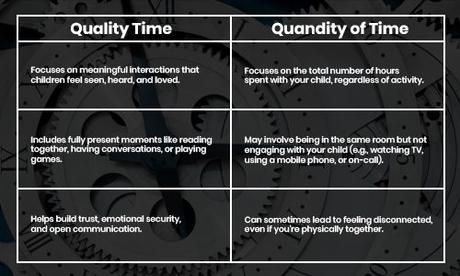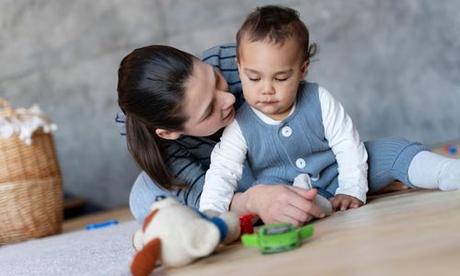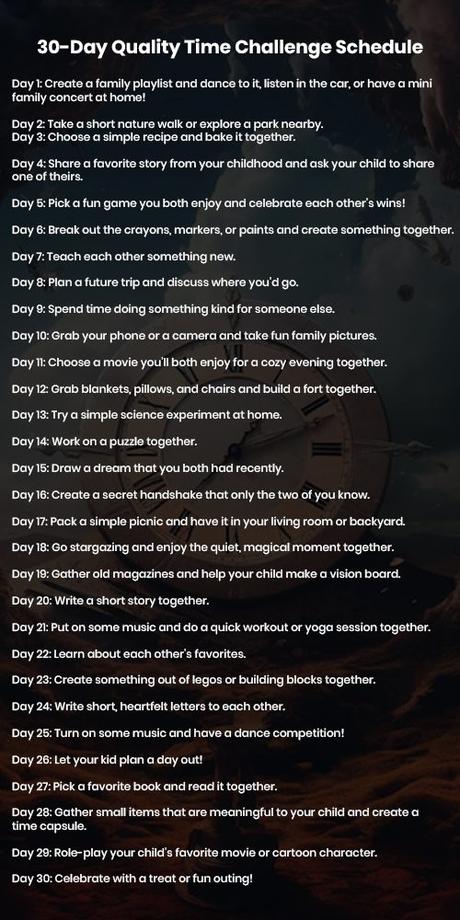
Factors That Determine How Much Time to Spend with Your Child

1. Age and Developmental Stage
Babies and toddlers need more hands-on care and attention, while teenagers may seek more independence but still benefit from open conversations and guidance.
2. Personality and Temperament
Some children crave constant attention and interaction, while others may enjoy independent playtime or quiet activities.
3. Family Structure
In single-parent households, balancing time between work and home can be challenging, while blended families may have unique dynamics in terms of time spent together.
4. Work Schedules and Commitments
Some parents have demanding jobs or irregular schedules, but the key is to focus on quality when you're available.
Benefits of Spending Time with Your Kids
Spending quality time with your children offers many benefits that can have a long-lasting impact on their development:
1. Emotional Development

When you spend quality time with your child, you help them develop emotional security. Children who feel loved and supported are more likely to express their emotions freely and build strong emotional connections with others.
2. Cognitive Growth

Interactive activities like reading books, solving puzzles, or talking about their day help stimulate your child's cognitive development. These moments foster curiosity, critical thinking, and language skills.
3. Boosts Self-Esteem

Knowing they have their parents' attention makes children feel valued. It gives them confidence and helps them develop a sense of self-worth. These positive interactions also promote a feeling of safety and trust.
4. Positive Behavior

Children who feel connected to their parents are less likely to engage in negative behaviors. Spending time together provides an opportunity for open communication, allowing kids to express concerns and frustrations in a safe space.
5. Better Academic Performance

Studies show that children who spend time with their parents tend to perform better in school. Engaging in activities like reading or problem-solving helps build skills that support academic success.
Age-Appropriate Time Needs
The amount of time children need with us varies depending on their age and stage of development. Let's break it down:
1. Infants and Toddlers (0-5 years)

At this stage, your child needs hands-on care and constant supervision. The more time you can spend engaging them in activities like reading, playing, and talking, the better for their development.
2. School-Aged Children (6-12 years)

3. Teenagers (13-18 years)

Teens value their independence, but don't let that fool you-they still need guidance and open communication. Regular check-ins, at least one-time family meals a day, attending to their interests (sports, hobbies) or even just being available when they need to talk go a long way in maintaining a strong connection.
While these numbers are flexible, the key takeaway is understanding what your child needs at each stage and the emotional connection you create during the time you spend together no matter how short or long.
Ways to Incorporate More Quality Time with Your Kids
Even with a busy schedule, there are simple ways to incorporate more quality time into your daily routine:
1. Make the Most of Everyday Moments
Turn daily tasks into opportunities to bond. Chat with your child during mealtime, bathtime, or while driving them to school. These moments can become meaningful conversations about their day, thoughts, or feelings.
2. Plan Family Time
Set aside specific times during the week for family activities, such as game nights, movie nights, or outdoor adventures. Having a consistent family routine helps children feel secure and strengthens bonds.
3. Get Involved in Their Interests
Whether your child loves sports, drawing, or science experiments, taking an interest in what they enjoy shows that you care about their passions. It's a great way to connect and make the time spent together more enjoyable for both of you.
4. Technology-Free Time
Put away your phone, turn off the TV, and spend time fully focused on your child. Whether it's playing a board game, reading a story, or taking a walk, technology-free time strengthens your bond and creates lasting memories.
What to Do If You Have Limited Time Due to Work or Other Responsibilities
- If weekdays are hectic, focus on weekends. Plan activities like bike rides, park visits, or cooking together.
- Involve your kids in simple tasks like cooking, grocery shopping, or cleaning. This not only gives you time together but also teaches valuable life skills.
- If you're a single parent or balancing a challenging job, don't be afraid to rely on family, friends, or caregivers for help.
The time you do spend with your child can still be meaningful, even if it's less frequent.
30-Day Quality Time Challenge
We've created the 30-Day Quality Time Challenge to help you dedicate just 15-30 minutes each day to connect with your child in a meaningful way. We are damn sure that over the next 30 days, you'll create lasting memories while strengthening your bond with your child. Ready to take the challenge?
Here's a list of suggested activities for each day, but feel free to mix and match based on your child's interests!


Sarah completed her Master's degree at Texas Woman's University, where she studied Psychology and Philosophy. She is fascinated by technological advancements in medicine, health, and biological sciences. As a full-time contributor at CompleteHealthNews.com, she creates credible evidence-based fitness advice and blogs about various health topics. When not writing, she enjoys meditation, reading, and finding ways of using technology to promote optimal mental, emotional, and relational health and well-being.

